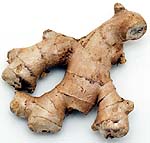The Health Benefits of Ginger

With the increase in the popularity of alternative and natural health solutions, many of the time-honored medical traditions of the east, such as the use of ginger root, are exciting the interest of clinical researchers. Ginger has a long history of medicinal use, particularly in traditional Chinese medicine and the Ayurvedic healing traditions of India. In recent years, a great deal of clinical research has been done on the potential health benefits of ginger.
Used for thousands of years to ease digestive complaints and nausea, among numerous other ailments, ginger has attracted the attention of numerous researchers throughout the world -- including those seeking a means of easing the side effects of some cancer and Hepatitis C treatments. The University of Michigan Cancer Center participated in a recent study, along with the National Institute for Cancer and the National Center for Complementary and Alternative Medicine. This particular study, formally titled as a "Phase II Trial Of Encapsulized Ginger As A Treatment For Chemotherapy-Induced Nausea and Vomiting," was a placebo control, double blind, and randomized.
The initial results seem to be encouraging. According to an article, published January 4, 2006, on the University of Michigan Comprehensive Cancer Center website, clinical research has demonstrated that ginger has significant medicinal potential. Suzanna Zick, N.D., MPH, research investigator in family medicine at the University of Michigan Health System, said that in addition to its uses for digestive tract ailments, ginger has been demonstrated to be useful for some types of arthritis.
Preliminary studies, according to the Maryland Medical Center, indicate that ginger may also benefit health by helping to lower cholesterol and serving to help prevent clotting of the blood. Studies have also indicated that, in a lab setting, "components in ginger may have anti-cancer activity." These early study results do look promising, but further clinical research is needed to determine how ginger can be useful in helping to treat heart disease and certain types of cancer.
The American Cancer Society, while acknowledging the potential health benefits of ginger, advises those that are using blood thinning agents to be sure to consult with their health care provider before using ginger medicinally. That is because some clinical studies indicate that ginger can potentially act as a blood thinning agent. This could prolong bleeding by reducing blood clotting abilities when combined with standard blood thinning or clot prevention medicines. It is because of this that some health care professionals advise pregnant women, especially those with indications of placental or other types of bleeding, to avoid using ginger during their pregnancies.
Further clinical trials and other research will study the potentials that ginger has to benefit health. As with any supplement or alternative medicine option, it is always best to seek the advice of a health care professional, especially when taking other medications or undergoing treatment for serious health conditions.
|